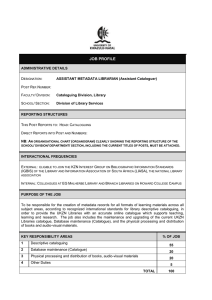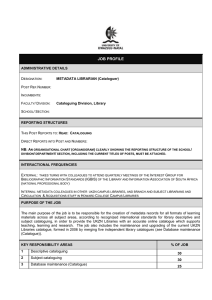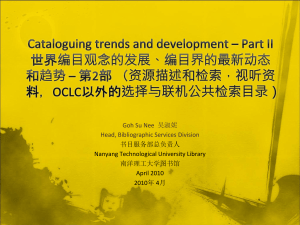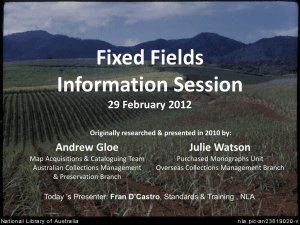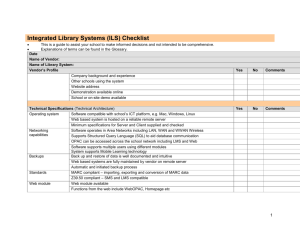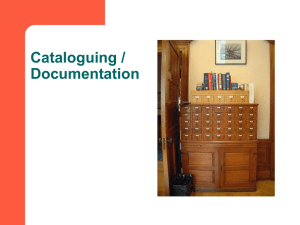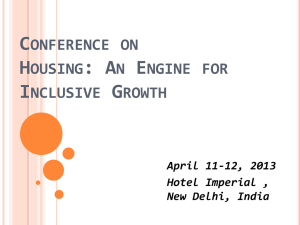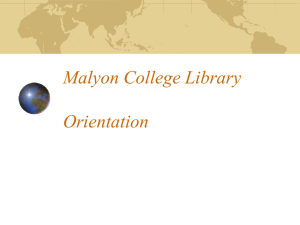Verus Solutions, Hyderabad
advertisement
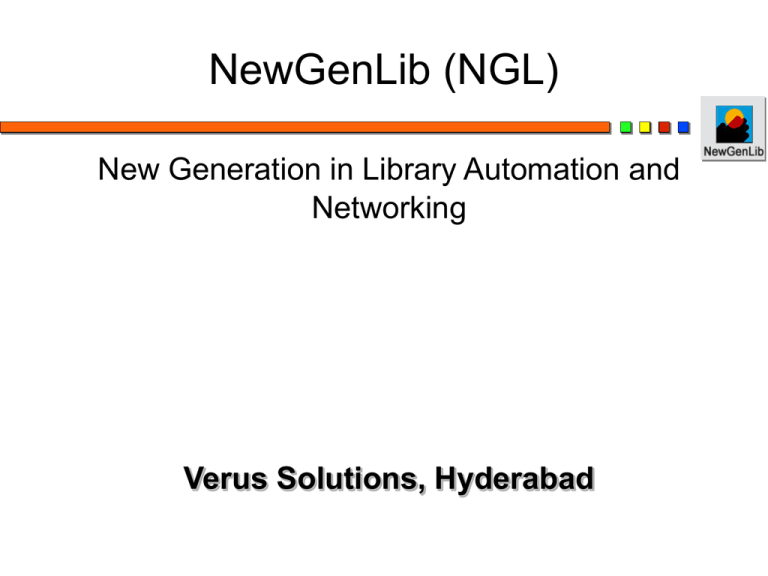
NewGenLib (NGL) New Generation in Library Automation and Networking Verus Solutions, Hyderabad Corporate Profile NGL is supported by a strong team of Developers Quality Assurance professionals Customer support engineers Trainers (Masters in Library Science) Channel partner network through out the globe Providing IT Services to Food and Agriculture Organzation of the United Nations and other global corporates NGL vision Empower the libraries to offer the best services to its users Enable the librarian to manage the library efficiently through Best practises Following global standards Milestones 1600+ satisfied Libraries across the globe 8 Abroad installations 14 Universities in India 2 International research organizations Corporates Media and Political parties Public libraries and Special libraries 20000+ downloads within 16 months NGL users growing everyday Salient features Freedom – Open source software available under GNU General Public License Functional modules are completely web based. Uses Java Web Start™ Technology Compatibility - Complies with international standards Affordable - Uses open source components Scalable, manageable and efficient Continued... Salient features OS independent - Windows and Linux flavors available Internationalized application (I18N) Example Unicode 3.0 complaint Arabic version available Easy extensibility to support other languages Data entry, storage, retrieval in any (Unicode 3.0) language Continued... Salient features RFID integration Networking – Hierarchical and Distributed networks Automated email/instant messaging integrated into different functions of the software Customizable OPAC interface Form letters are configurable and use XMLbased OpenOffice templates Continued... Salient features Extensive use of set up parameters enabling easy configuration of the software to suit specific needs, e.g., in defining patron privileges Supports multi-user and multiple security levels Allows digital attachments to metadata Salient features – Support for International Standards MARC21 – Bibliographic data Bibliographic record data structures designed for MARC21 formats Import and Export in ISO 2709 Import and Export in MARCXML MARC21 – Authority files Authority files data structures designed for MARC21 formats Import available in ISO 2709 Continued... Salient features – Support for International Standards MARC21 – Holdings Holdings data structures designed for MARC21 Holdings. Z39.71 – Holdings statement display MODS 3.0 Bibliographic records can be exported in MODS 3.0 Continued... Salient features – Support for International Standards ISBD Record display and punctuations as per ISBD OAI – PMH (Digital libraries) Allows harvesting (manual) from external repositories Create Open archive collections, and items, search the repositories and also act as data provider Metadata formats: MARC XML, DUBLIN CORE, MODS 3.0 and AGRIS AP Continued... Salient features – Support for International Standards SRU/W Federated search engines can search bibliographic databases using this protocol Query language: CQL (Common Query Language), bench marking Level 1 compliance Profiles used: BATH, and DUBLIN CORE Metadata standards: MARC XML and MODS 3.0 Architecture Technologies used J2SE Swing J2EE Servlets JSPs Struts framework Open Office Jakarta POI Jasper Reports Hibernate Java Mail EJB JBoss Application Server XCQL – CQL parser(open source) Postgresql XML - JDOM Functional modules Acquisitions Database Server Technical Processing Serials Management Application Server Circulation Administration OPAC NewGenLib Desktop (Reports) End Of Day Process (Scheduler) Acquisitions Support for online requests by users Modes of acquisition supported Firm orders On-approval purchases Standing orders Solicited gifts Unsolicited gifts Exchange-triggered acquisitions Management information reporting to enable better decisions in acquisitions management Cataloguing Cataloguing data-entry using 3 different templates Simple General MARC21 Import of MARC records from sources such as OCLC or from free MARC download sites on the web, e.g., LOC Access to ten Authority Files during data-entry and catalogue database searching Continued... Cataloguing Attachments enable access to internal and external digital content, e.g., multimedia, webbased resources, scanned images, and full text digital documents Virtual keyboards for multilingual data entry Possibility for entry of data for analytics (journal articles, book chapters). Option to add an item to the digital institutional archive. Such records become searchable via the OPAC and also become available for Continued... harvesting by others. Cataloguing Automatic validation of entered cataloguing data using authority files Context-sensitive help using MARC and AACR-II standards during cataloguing dataentry Cataloguing data-entry possible in Arabic, and Indian languages Catalogue search by several keys incl. phrase, any, or all terms plus the possibility of applying search limits Catalogue record displays/downloading possible in different formats, e.g., MARC records, citations, labeled output, MARC-XML Online Public Access Catalogue (OPAC) Patrons have browser-based access to the library’s or the Library Systems’ LAN/Intranet or web-based catalogue database Extensive search, retrieval, display, print, email, download and formatting options for patrons Citation or tabular display Labeled Text format MARC Tagged ISO 2709 MARC XML Dublin core Continued... Online Public Access Catalogue (OPAC) SDI Profiles A Google-like search interface in addition to basic and advanced search options An Expert search interface for defining and executing complex searches by information specialists Users can define their SDI profiles online that are executed at user-defined intervals. Output to them sent via email Continued... Online Public Access Catalogue (OPAC) Library staff interact with patrons via instant messages when a user logs-in to the OPAC or via email OPAC can be configured with an Institution’s home page Librarians/Information Managers access statistics of OPAC usage Circulation Library-configurable parameters to enable the setting of a wide range of circulation options, fines, user privileges, etc., needed in different library environments Rapid charging, discharging, renewal via barcode readers; reservation operations, Built-in traps for delinquent users, reservations, etc., Inter-library transactions supported Binding management; inventory management Serials Management Integrated management of serials subscriptions, registration, cataloguing and binding Rapid registration of incoming serials using a Kardex-like interface Batch and on-demand claiming for missing issues Management Information reporting for better serials management Implementation services Requirement Analysis Data migration Services Installation and Commissioning services Training Services Advanced training program Customer support services Email based support Telephone based support Customer Support On-line Chat and Voice chat support Support Engineer in-person Visit Contact details Verus Solutions Private Limited, Hyderabad AP, India Email: sales@verussolutions.biz info@verussolutions.biz Phone: +91 40 27719161/2/3, 3242 2232, 3240 6537 Thank you
